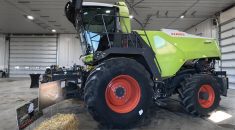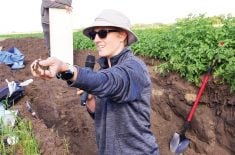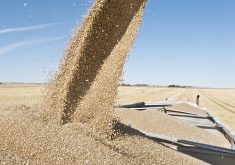The number of clubroot resistant canola varieties available to Western Canadian canola growers continues to expand.
Ray Gadoua, co-ordinator of the Western Canada Canola Rapeseed Recommending Committee, said 77 new canola cultivars were recommended for registration at a meeting in Saskatoon.
They included four new clubroot resistant B napus varieties, two developed by Monsanto and two by Pioneer Hi-Bred.
Monsanto’s varieties, Dekalb 73-67RR and Dekalb 73-77RR, are expected to be available in limited quantities for 2010 planting pending approval by the Canadian Food Inspection Agency.
Read Also

Claas brings 1000 Series SP forage harvesters to Canada
In mid-August, Claas unveiled its new line of Jaguar forage harvesters at an event in Visalia, California, deep in the heart of that state’s dairy region.
Monsanto officials say approval is expected later this month.
Pioneer’s varieties, 9558C and D3152, are also expected to be available in limited quantities for 2010 production. If the varieties are approved, western Canadian producers will have access to five clubroot resistant canola varieties for 2010 seeding.
Pioneer’s 45H29, a Roundup Ready hybrid, was the first clubroot resistant variety registered in Canada.
Rachel Faust, communications manager with Pioneer Hi-Bred, has indicated that seed availability of 45H29 will be limited in 2010 but the company should have enough seed to supply all clubroot affected areas in Alberta.
The clubroot pathogen was identified about seven years ago in canola fields near Edmonton.
Since then, the disease has spread to 500 fields in an area covering 20,0000 sq. kilometres.
Monsanto submitted its lines to the WCCRRC a year earlier than normal.
The WCCRRC does not normally recommend a new canola line for registration until two years of agronomic data have been complied but a line with less than two years of data can be recommended for emergency registration.
“We believe the presence of clubroot on Alberta farms is an ongoing emergency situation for growers and they need access to solutions that are widely available from as many seed suppliers as possible,” said Dekalb marketing manager Cornie Thiessen.
The Dekalb varieties were multiplied at an off-season production facility in Chile in an effort to expedite seed multiplication.
Bayer Crop Science has also indicated that it plans to have clubroot resistant varieties available by 2012.
Although new clubroot resistant material is becoming available, field-scale performance is unproven.
According to Gadoua, the WCCRRC does not scrutinize clubroot resistance claims.
“We don’t actually evaluate for clubroot resistance so the claims are taken at face value,” he said.















